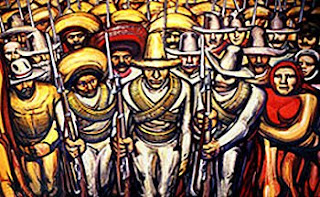Mexico is an interesting place at the moment. Human rights violations are rampant and protected by a veil of impunity. Defenders of human rights and social protestors are often caught in the crossfire of a government policy that has been characterized by the "war on drug trafficking and organized crime". This government policy favours State Security over Human Security.
While maybe militarization to many people may sound like a scary prospect, certainly in Mexico it is something that goes largely unquestioned by a lot of people. In a country where the daily news is kidnappings, shoot outs with drug traffickers, police raids and big hoardes of narcotic substances uncovered, it many ways it makes a lot of sense that the public sees a man in khaki uniform and feels relieved. Especially when the police are so sorely hated for their corruption and colluding with drug traffickers. Yes, bring in the military, people will say.
So, this issue was particularly challenging to debate with many people a few weeks ago, when images of a shoot out between the military, police and drug traffickers right near a kindergarden in Tijuana were streamed across the country to the shock of citizens. Of course, as a parent, I understand that you would say "heck, if there are bullets near my child, I want anyone, the army, the navy, the fire brigade to get them out of there". And that's true. And the army can be called on in situations of emergency such as these, when done so in a limited response. There are cases where police will not have the capacities that the military have.
But what the military is not hired for, nor authorised to do, is the investigation, prosecution and enforcement of matters that by their nature are civilian.
Social protests, drug charges, undocumented immigration, these are matters that do not require nor merit the use of military forces.
There are number of reasons for this, some of the most important being that soldiers' training is just not police training, and they are not meant for civil law enforcement. Another huge reason is that when a military officer violates human rights, they are not judged bythe normal civil justice code, but "el fuero militar". The military system. Technically under Mexican law there are provisions saying that an off duty soldier should be charged like a normal criminal, but the interpretation and application of such a law does not turn out this way. Nor is it helpful that the military system of "orders" means that conduct by a soldier is often absolved on the assumed basis that it is in line with such orders.
Murders, rapes, raids, harrassment? Yeah, really things that are gonna be following the code.
It is interesting, as I said that there is plenty of fear in Mexico. The nighly news or the papers do not help. Oh, and a small bomb went off in Mexico City a few weeks ago, linked with drug trafficking and aimed at the head of the city police (it went off outside his office). That kind of unnerved lots of people, as usually the "frontline battles" are in the states of Mexico, and Mexico City just gets the kidnaps and the drug busts where police find millions of dollars in a house or escort a drug lord out of a heavily populated decadent restaurant.
So, with all these fear, many communities are willing to accept the incursion of the military in their lives, on their crops, etc. But as soon as communities realize the impact of the military, they start crying out for them to go away (eg. CHIAPAS).
There are countless other problems involved in the militarization of the country. One huge one is the PFP, la Policia Federal Preventativa a federal "police" force that has many military elements within it, totally blurring all legal definitions and turning up at every social protest to carry out brutally repressive operations.
In all of this context comes the recent criminal reforms that have made their way at a constitutional level into the mexican system. A lot of the reforms are actually very much needed, like moving from a written, inquisitory trial system to an oral one (which most of Latin America has already done to differing succes). However Centro Prodh where I work has been fighting against some of the provisions of the reform that have terribly worrying implications. Civil society has succeeded in getting some thing out of the reform: eg. stopping a constitutional sanction for all unwarranted entries into houses to be allowed without judicial orders.
However, some of the gravest parts remain: such as the infamous arraigo. A very very mexican form of arbitary preventative detention, so mexican that when we translate this term we can't even find a translation and leave it in spanish with italics!
Basically arraigo is kind of "a process before any legal process" that goes above and beyond any legal limits of locking someone up.
Enjoy!
I couldn´t put it better than Human Rights Watch:
Washington, D.C., March 6, 2008
President Felipe de Jesús Calderón Hinojosa
Los Pinos
México D.F.
México
Dear President Calderón,
I am writing to share some observations regarding the justice reform package that was approved by the Mexican Congress today. The reform is, in some respects, an historic step forward for Mexico, as it creates the basis for an oral and adversarial justice system and contains measures that are critical for promoting greater respect for fundamental rights. We welcome, for example, the proposal to include the basic guarantee of presumption of innocence in the Mexican Constitution.
At the same time, however, we are deeply concerned about other provisions that will violate Mexico’s international human rights obligations if this reform enters into force. Of particular concern is the proposal to modify article 16 of the Mexican Constitution to allow prosecutors, with judicial authorization, to detain individuals suspected of participating in organized crime before they are charged with a crime. This pre-charge detention would be possible for a period of up to 40 days if “it is necessary for the success of the investigation, to protect individuals or goods, or when there is a justified risk of flight.” The 40-day limit could be extended for up to an additional 40 days if the circumstances that gave rise to it continue to exist.
This proposed 80-day limit would be, by far, the longest of its kind in any Western democracy. In other countries, the limit for any form of pre-charge detention, or preventative detention, is generally less than seven days. In the context of combating terrorism, for example, the maximum period allowed for pre-charge detention in Canada is one day; in the United States, Germany and South Africa it is two days; in Italy and Spain it is five days; and in Ireland and Turkey it is seven days. The United Kingdom recently extended the time limit for pre-charge detention for certain terrorism related offenses to 28 days, making it the Western democracy with the longest pre-charge detention time. However, British courts have yet to adjudicate on whether this is consistent with human rights law, although previous case law indicates that such a long pre-charge detention period is not permitted.
Detention without charge for such a long period of time violates the fundamental right to liberty and security of the person and the associated protections against arbitrary detention enshrined in international law. The American Convention on Human Rights (Article 7, ACHR), the International Covenant on Civil and Political Rights (Article 9, ICCPR), and the European Convention on Human Rights (Article 5, ECHR) all require that an individual arrested or detained on reasonable suspicion of having committed an offense must be “informed promptly” of the charge against him or her and “brought promptly” before a judge or other officer authorized by law to exercise judicial power. The Human Rights Committee applying Article 9 (2) of the ICCPR that requires anyone arrested to be “promptly informed of any charges against him” found detainment for seven days without charge to be a violation.1 The European Court of Human Rights has held that to hold a person for a period of fourteen or more days, even where there was a state of emergency and threat of terrorism, without them being charged was a violation. It deemed the period “exceptionally long,” rendering detainees vulnerable not only to arbitrary interference with the right to liberty but also to torture.2
A second provision proposed in the new constitutional text that also raises serious human rights concerns is the one that denies judges the power to decide, in cases involving one of a prescribed list of offenses, whether a defendant should remain in jail or be provisionally released pending and during trial. On the one hand, the reform package proposes that the right to presumption of innocence be incorporated in the Constitution and that pretrial detention should only be used when other precautionary measures are not enough to prevent, for example, the risk of flight, interference with the investigation, or security of the victim or witnesses. But it also states that judges must order pretrial detention if the person is accused of a series of crimes listed in the Constitution.
When there is no possibility of obtaining pre-trial liberty, the detention of accused but unconvicted persons, particularly where it may last for a substantial period, ultimately impinges on the presumption of innocence, one of the most established and widely accepted elements of the right to a fair trial. Article 8(2) of the ACHR expressly establishes that every person accused of a criminal offense has the right to be presumed innocent. Article 14 of the ICCPR also provides that “everyone charged with a criminal offense shall have the right to be presumed innocent until proved guilty according to law.” Article 9(3) of the ICCPR explicitly establishes that a person charged but not yet convicted of a crime should not, as a general rule, be kept in detention. According to the United Nations Human Rights Committee, pretrial detention may only be used if it is lawful, reasonable, and necessary. It is only appropriate if it is necessary “to prevent flight, interference with evidence or the recurrence of crime” or “where the person concerned constitutes a clear and serious threat to society which cannot be contained in any other manner.”3
Again, I would like to reiterate that the reform package contains historic measures that could greatly strengthen Mexico’s justice system. However, the two provisions discussed here, regarding pre-charge and pre-trial detention, will need to be modified in order to prevent serious human rights abuses in the future.
Sincerely,
José Miguel Vivanco
Executive Director
Americas Division
1 Kurbanov v Tajikistan, No.1096/2002 para. 7.2.
2 Aksoy v Turkey, [1996] ECHR 68 (December 18, 1996) para. 66 – 78.
3 Hugo van Alphen v. the Netherlands (No. 305/1988) (July 23, 1990), Official Records of the General Assembly, Forty-fifth Session, Supplement No.40 (A/45/40), vol. II., annex IX, sect. M., para. 5.8. Similarly, the Eighth United Nations Congress on the Prevention of Crime and the Treatment of Offenders established that: (b) Pre-trial detention may be ordered only if there are reasonable grounds to believe that the persons concerned have been involved in the commission of the alleged offenses and there is a danger of their absconding or committing further serious offenses, or a danger that the courts of justice will be seriously interfered with if they are left free; (c) In considering whether pre-trial detention should be ordered, account should be taken of the circumstances of the individual case, in particular the nature and seriousness of the alleged offense, the strength of the evidence, the penalty likely to be incurred, and the conduct and personal and social circumstances of the person concerned, including his or her community ties. Eighth United Nations Congress on the Prevention of Crime and the Treatment of Offenders, Havana, 27 August-7 September 1990: report prepared by the Secretariat (New York: United Nations, 1991), E.91, IV , chap.I, sect.C (para.2).










